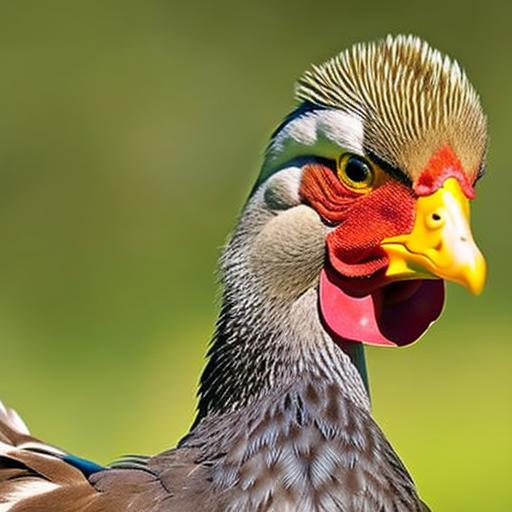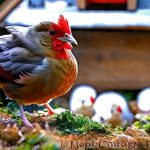Keeping chickens and ducks together is a popular choice for many backyard poultry enthusiasts. Not only do these two species make great companions, but they also offer a variety of benefits when kept together. As someone who has personally kept chickens and ducks together, I can attest to the joy and rewards that come with this unique combination.
Key Takeaways
- Keeping chickens and ducks together is possible and can have benefits.
- Chickens and ducks have some similarities in terms of care, but also some differences.
- Keeping chickens and ducks together can lead to better pest control and a more diverse flock.
- Potential challenges include differences in diet and social dynamics between the two species.
- Housing and feeding requirements should be carefully considered when keeping chickens and ducks together.
Similarities and Differences between Chickens and Ducks
Chickens and ducks may both be poultry birds, but they have distinct physical characteristics and behavioral differences. Chickens are typically smaller in size, with feathers that come in a wide range of colors and patterns. Ducks, on the other hand, are larger and have webbed feet that make them excellent swimmers. They also have a more streamlined body shape compared to chickens.
In terms of behavior, chickens are known for their scratching and pecking habits. They spend a lot of time on the ground, searching for insects and other small creatures to eat. Ducks, on the other hand, are more aquatic in nature. They enjoy swimming in water and have a natural instinct for foraging in wet environments.
When it comes to egg-laying habits, chickens are known for their consistent production of eggs. They typically lay eggs in nesting boxes or designated areas within the coop. Ducks, on the other hand, have a more sporadic egg-laying pattern. They may lay eggs in various locations, including on the ground or in water.
Advantages of Keeping Chickens and Ducks Together
One of the main advantages of keeping chickens and ducks together is pest control. Chickens are excellent at hunting down insects and other pests that may be lurking in your yard or garden. Ducks, on the other hand, are great at controlling slugs and snails, which can be a nuisance to plants. By keeping both species together, you can effectively manage pest populations without the need for harmful chemicals.
Another benefit of keeping chickens and ducks together is the fertilization of soil. Both species produce manure that is rich in nutrients, which can be used to improve the quality of your garden soil. Chickens and ducks will naturally spread their manure as they forage, helping to enrich the soil and promote healthy plant growth.
Additionally, chickens and ducks can provide companionship for each other. Chickens are social animals that thrive in the company of others. Ducks, with their friendly and curious nature, can provide a sense of companionship and entertainment for chickens. This can help reduce stress and promote overall well-being for both species.
Lastly, keeping chickens and ducks together can offer a variety of eggs. Chickens are known for their classic brown or white eggs, while ducks produce larger eggs with a unique flavor profile. By having both species in your flock, you can enjoy a diverse selection of eggs for cooking and baking.
Potential Challenges of Keeping Chickens and Ducks Together
While there are many advantages to keeping chickens and ducks together, there are also some potential challenges to consider. One challenge is the different dietary needs of chickens and ducks. Chickens require a balanced diet that includes grains, protein, and calcium. Ducks, on the other hand, have a higher need for protein and require access to water for proper digestion. It’s important to provide separate feeders for each species to ensure they are getting the appropriate nutrition.
Another challenge is the risk of disease transmission between chickens and ducks. While both species can be susceptible to certain diseases, they may have different levels of resistance or immunity. It’s important to practice good biosecurity measures, such as regular cleaning and disinfection of the coop, to minimize the risk of disease transmission.
Social hierarchy conflicts can also arise when keeping chickens and ducks together. Chickens have a well-established pecking order, where dominant individuals assert their authority over others. Ducks, on the other hand, have a more egalitarian social structure. This difference in social hierarchy can sometimes lead to conflicts and aggression between the two species. Providing ample space and resources can help minimize these conflicts.
Housing Requirements for Chickens and Ducks
When keeping chickens and ducks together, it’s important to provide appropriate housing that meets the needs of both species. The coop and run should be spacious enough to accommodate both chickens and ducks comfortably. It’s recommended to have at least 4 square feet of coop space per chicken and 10 square feet of run space per bird.
Nesting boxes and roosting bars should also be provided for chickens. Chickens prefer to lay their eggs in designated nesting boxes, which should be filled with clean bedding material. Roosting bars should be provided for chickens to perch on at night.
For ducks, a water source is essential. Ducks need access to water for swimming and cleaning their feathers. This can be provided through a small pond or a shallow container that is regularly cleaned and refilled with fresh water.
Feeding and Nutrition for Chickens and Ducks

Chickens and ducks have different dietary needs, so it’s important to provide appropriate feed for each species. Chickens require a balanced diet that includes grains, protein, and calcium. Commercial chicken feed is readily available and formulated to meet their nutritional needs.
Ducks, on the other hand, have a higher need for protein and require access to water for proper digestion. Duck feed is available commercially and contains higher levels of protein compared to chicken feed. It’s important to provide separate feeders for each species to ensure they are getting the appropriate nutrition.
In addition to commercial feed, both chickens and ducks can benefit from foraging for insects, worms, and other small creatures in the yard or garden. This helps supplement their diet with natural sources of protein.
Health Concerns and Disease Prevention for Chickens and Ducks
Chickens and ducks can be susceptible to certain diseases and illnesses, so it’s important to take preventative measures to keep them healthy. Common diseases that can affect both species include respiratory infections, parasites, and viral infections.
To prevent the spread of disease, it’s important to practice good biosecurity measures. This includes regular cleaning and disinfection of the coop, providing clean bedding material, and separating sick or injured birds from the rest of the flock.
Regular health checks should also be conducted to monitor the overall well-being of the flock. This includes checking for signs of illness or injury, such as changes in behavior, loss of appetite, or abnormal droppings. If any concerns arise, it’s important to consult a veterinarian who specializes in poultry health.
Social Dynamics between Chickens and Ducks
Chickens and ducks have different social dynamics, which can sometimes lead to conflicts or aggression. Chickens have a well-established pecking order, where dominant individuals assert their authority over others. This hierarchy is established through pecking and other aggressive behaviors.
Ducks, on the other hand, have a more egalitarian social structure. They do not have a strict pecking order and tend to be more tolerant of each other. However, conflicts can still arise between individuals, especially during breeding season or when resources are limited.
Providing ample space and resources can help minimize conflicts between chickens and ducks. This includes providing multiple feeding and watering stations, as well as plenty of space for both species to roam and forage.
Egg Production and Management in a Mixed Flock
When keeping chickens and ducks together, it’s important to manage egg production effectively. Chickens are known for their consistent production of eggs, which can be collected from nesting boxes or designated areas within the coop.
Ducks, on the other hand, have a more sporadic egg-laying pattern. They may lay eggs in various locations, including on the ground or in water. It’s important to regularly check for duck eggs and collect them to prevent them from being damaged or lost.
Differences in egg size and color can also be observed in a mixed flock. Chickens typically lay medium-sized eggs that come in a range of colors, including brown, white, and blue. Ducks, on the other hand, lay larger eggs that are usually white or off-white in color.
Is Keeping Chickens and Ducks Together Right for You?
Keeping chickens and ducks together can be a rewarding experience for backyard poultry enthusiasts. The advantages of pest control, soil fertilization, companionship, and variety of eggs make it an appealing choice for many. However, it’s important to consider the potential challenges, such as different dietary needs and social hierarchy conflicts.
If you are considering keeping chickens and ducks together, it’s important to provide appropriate housing, feeding, and healthcare for both species. By taking the necessary precautions and providing a suitable environment, you can create a harmonious and thriving mixed flock.
As someone who has personally kept chickens and ducks together, I highly recommend giving it a try. The joy and rewards that come with this unique combination are truly worth it. So go ahead, embrace the beauty of diversity in your backyard and enjoy the benefits of keeping chickens and ducks together.
If you’re considering keeping chickens and ducks together, it’s important to understand the compatibility and potential challenges that may arise. In a related article on Poultry Wizard, you can find valuable insights on how to successfully integrate these two poultry species. From managing their different dietary needs to providing suitable housing, this article offers practical tips and advice for creating a harmonious environment for your feathered friends. To learn more about keeping chickens and ducks together, check out the article here.
FAQs
What are the differences between chickens and ducks?
Chickens and ducks are different in terms of their physical appearance, behavior, and needs. Chickens have feathers that are more compact and they have a more upright posture. Ducks, on the other hand, have more water-resistant feathers and a more horizontal posture. Chickens are more social and prefer to stay on land, while ducks are more independent and enjoy swimming.
Can chickens and ducks live together?
Yes, chickens and ducks can live together. They can coexist peacefully as long as they have enough space, food, and water. However, it is important to note that they have different needs and preferences, so it is important to provide them with separate areas for nesting and feeding.
What are the benefits of keeping chickens and ducks together?
Keeping chickens and ducks together can be beneficial for both species. Chickens can help keep the duck coop clean by eating insects and other pests, while ducks can help keep the chicken coop clean by eating leftover food and droppings. Additionally, they can provide each other with companionship and protection from predators.
What are the challenges of keeping chickens and ducks together?
One of the main challenges of keeping chickens and ducks together is that they have different dietary needs. Chickens require more protein than ducks, so it is important to provide them with separate feeders. Additionally, ducks need access to water for swimming and cleaning, which can create a wet and muddy environment that may not be suitable for chickens.
What should I consider before keeping chickens and ducks together?
Before keeping chickens and ducks together, it is important to consider the space and resources available. They will need separate areas for nesting and feeding, as well as access to water for the ducks. Additionally, it is important to research the specific needs and behaviors of each species to ensure that they can coexist peacefully.
Meet Walter, the feathered-friend fanatic of Florida! Nestled in the sunshine state, Walter struts through life with his feathered companions, clucking his way to happiness. With a coop that’s fancier than a five-star hotel, he’s the Don Juan of the chicken world. When he’s not teaching his hens to do the cha-cha, you’ll find him in a heated debate with his prized rooster, Sir Clucks-a-Lot. Walter’s poultry passion is no yolk; he’s the sunny-side-up guy you never knew you needed in your flock of friends!







